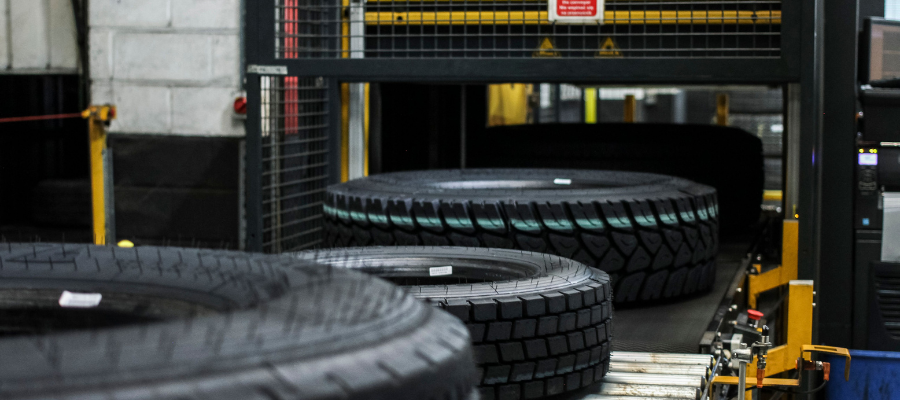🕒 Article read time: 2 minutes
Retreading – saving costs and reducing impact
Sponsored content

Tony Stapleton, Head of Group Fleet Sales, Continental Tyres
Fleet operators, quite rightly, demand tyre products which are as efficient as possible, to help lower overall driving costs and improve bottom line margins. Retreads are one of the most effective ways to drive down such costs, while also lessening environmental impact.
For Continental Tyres, retreads are an important part of its commercial vehicle offering, via both its ContiRe and Bandvulc branded product line up.
BENEFITS OF RETREADS
As well as being a more environmentally sound option, a correctly used retread is more cost-effective in the long term – answering both customer purchase drivers. For example, a retread costs around 70-75% of the price of a brand-new tyre, offering excellent value for money and significantly reducing running costs in a competitive market.
Low-cost, single-life tyres may offer a cheaper option at purchase, but they are not always suitable for retreading and therefore cost more to scrap and replace. Premium tyres, such as those manufactured by Continental, are designed and built with the ability to be retreaded in the future.
Retreaded tyres still offer outstanding performance and endurance. Bandvulc is the UK’s leading commercial retreader, with 50 years’ experience in retreading and casing management for high-quality retreads in both Continental’s ContiRe and Bandvulc brands. All ContiRe and Bandvulc tyres adhere to ECE Reg 109 – a compulsory standard for producing retreaded tyres, which ensures that they fulfil similar safety and quality control requirements for new tyres.
At the Bandvulc UK-based facility in Ivybridge, each casing is subject to up to 20 different quality assurance checks, before releasing it for road use. Special compounds created by its own rubber mixing facility, Bandvulc Mixing, offers benefits for longer life, low rolling resistance and damage reduction. For these reasons, the claim ratio for Bandvulc retreaded tyres is as low as it is for its new tyres.
SUSTAINABLE TYRES BORN FROM SUSTAINABLE MANUFACTURING
A retreaded tyre saves 80% of the materials required to manufacture a new tyre, therefore significantly reducing the impact on the environment. This means Bandvulc is able to save 30kg of rubber compound, up to 20kg of steel and 60kg of CO2 on every retread tyre produced compared to a new tyre.
In addition, retreading tyres reduces scrapping, exportation and incineration of worn-out tyres which, over the course of a year, can release over 160,000 tonnes of CO2 into the air.
The advanced energy monitoring system at the Bandvulc manufacturing facility keeps close track of the energy levels and output of every piece of equipment across the whole factory, ensuring environmental sustainability and efficiency at every stage of the process. The factory has also introduced a zero-to-landfill policy, which ensures that no production waste goes to landfill and, as a result, 100% of the factory’s waste is recycled. Even rubber dust, buffed off during the preparation process, is recycled back into new tyres.
GET ON THE CASE
If fleets wish to truly reap the benefits that retreading can bring, they should also ensure they understand how good tyre casing management can help.
For best possible cost efficiency, the fleet needs to ensure that they are maximising the number of casings that are suitable for retreading. Good tyre husbandry, such as ensuring tyre pressure maintenance, regular inspections for damage etc. can also help to ensure a high level of casing acceptance, which is crucial for retreads.
After Continental collects a fleet’s tyres and returns them to its plant in Ivybridge, the casings are professionally inspected by the in-house team. They determine whether the casing can be retreaded. This process can also shed light on any application or usage concerns, which result in the tyre being removed prematurely or the casing being unsuitable for retreading.
For example, the checks can identify if the tyre has been placed on the wrong axle, if the wheel is misaligned, or the tyre has been run under- or over-inflated. In any of these scenarios, the inspection team can often determine the cause of damage from the state of the tread and can provide constructive advice back to the fleet operator/service provider to address any application or usage issues and improve fleet performance, efficiency and safety.
*www.continental-tyres.co.uk/truck
Published On: 25/03/2021 17:00:28

Comments Section
If you are a Logistics UK member login to add comments.